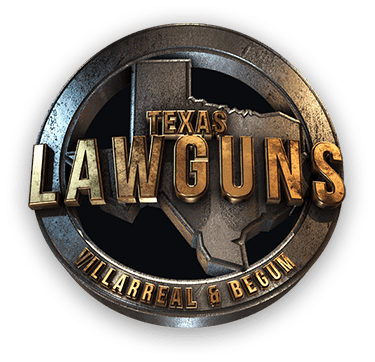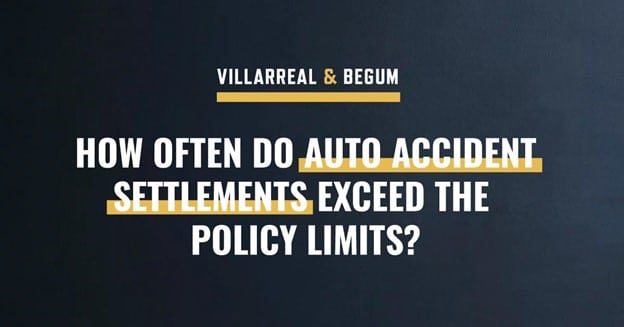Texas roads appear to be more dangerous than ever. In 2021, a total of 4,480 people were killed, making it the second deadliest year on record since the Texas Department of Transportation started keeping track of fatalities in 1940. Those who survive are often left with huge medical bills, months of lost income, and even permanent disability.
These are significant losses, and accident insurance policies in Texas have settlement limits that don’t always account for high medical costs. Consequently, our clients often ask us how often auto accident settlements exceed the policy limits and what happens if their damages amount to more than the maximum. Let’s explore and answer that question in this blog.
Auto Insurance Policy Limits in Texas
According to Texas law, all drivers must maintain liability coverage on their vehicles. There is a minimum limit of $30,000 for bodily injury to a single person, $60,000 for bodily injury in any one accident, and $25,000 for property damage. This is called 30/60/25 coverage. Additional coverage can be obtained beyond the minimums, but it is completely up to the individual driver.
There are some cases in which a settlement exceeds the policy limits, but they are very rare. An insurance company typically pays up to the policy limits for an at-fault driver in a car accident. Only an experienced auto accident attorney can handle those settlements that exceed insurance policy limits, so if you’ve experienced devastating injuries that could impact you for life, call the Texas Law Guns, Injury & Accident Lawyers.
Pursuing Additional Compensation for a Car Accident
When the at-fault driver doesn’t have sufficient coverage for all your losses, a few options are typically available to you, including suing the at-fault driver or suing another at-fault party. There is also the chance that you may recover more money under your own insurance coverage or the Stowers Doctrine.
Suing the At-Fault Driver
When the policy limits in compensation are exceeded, Texas law permits a victim to pursue the personal assets of the person responsible. However, judgments can only be collected on non-exempt assets like vacation homes, second properties, and extra cars. A person’s primary residence, car, wages, vehicles and equipment used in their occupation, personal belongings, etc., cannot be seized to satisfy a judgment. Consequently, it can be difficult to collect compensation for settlements exceeding the policy limits.
Suing Additional Parties
In major accidents, multiple parties may be at fault. Depending on the circumstances, you may be able to collect damages under more than one insurance policy. For example, an employer or manufacturer may be liable for damages if the other driver was driving for business or operating a company vehicle, or if there was an auto defect or malfunction that led to the accident. Your attorney can assist you in identifying other parties who might be responsible.
Reviewing Your Own Coverage
If the negligent driver’s insurance policy doesn’t cover everything, you may be able to turn to your personal injury protection (PIP) or underinsured motorist coverage.
Personal Injury Protection (PIP)
PIP insurance covers your medical expenses, lost wages, and other costs if you’re injured in a car accident, no matter who is at fault. PIP also covers the medical expenses of passengers injured in a collision. Every driver in Texas is required to carry at least $2,500 of personal injury protection unless you sign a waiver declining coverage. If you want additional financial protection, you can usually purchase coverage for $5,000 or $10,000.
Underinsured Motorist Coverage
Underinsured or uninsured motorist coverage pays for injuries caused by drivers who either leave the accident scene and can’t be located, is uninsured and lacks the financial means to pay your damages, or has insurance but the coverage is insufficient.
The Stowers Doctrine and Bad Faith Insurance Practices
The Stowers Doctrine states that if your lawyer offered a reasonable settlement within the policy limits but it was refused and a jury awards compensation beyond the policy limits, the insurance company may be liable for the entire verdict. As a result, both the insurer and defendant may be liable for the judgment, including the excess amount. These legal situations can become extremely complicated, so it is important that you have a knowledgeable attorney by your side.
How Can a Texas Car Accident Lawyer Help?
If you’ve been seriously injured in a car accident, your best course of action is to retain an experienced auto accident lawyer right away. The insurance companies will often try to get you to sign a quick settlement agreement so you have faster access to money, but what they won’t tell you is that by doing so, you will lose your right to recover additional damages. The effects of some car accidents can last for quite some time, and accepting a settlement offer too soon may leave you on the hook for your future medical expenses.
By hiring a personal injury lawyer, you give yourself the best chance of getting the compensation that covers your medical treatment and helps you meet your living expenses while you recover from your injuries. Your lawyer can facilitate access to the right treatments and negotiate or litigate for the money you need, even if it exceeds the negligent driver’s auto policy limit.
Get a Free Consultation From a Texas Auto Accident Lawyer
In most cases, the at-fault driver’s insurance will cover your compensation. There are times, however, when an injury victim’s damages exceed their insurance coverage, leaving them with medical bills and living expenses they can’t afford to pay.
At Texas Law Guns, Injury & Accident Lawyers, we protect you from any and all attempts to reduce your compensation. We will collect your medical records and other documentation, negotiate directly with the insurer on your behalf, and even take your case before a jury if the insurer appears to be acting in bad faith. We have recovered millions of dollars in compensation for past clients and will fight for the outcome you need to recover. You only pay us if we win, so to get started, contact us for a free consultation.

Alexander Begum has tried over 50 trials to verdict and tried or settled over $500 million in cases. Alex is a founding shareholder of the Texas Law Gun, Injury and Accident Lawyers.




